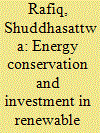|
|
|
Sort Order |
|
|
|
Items / Page
|
|
|
|
|
|
|
| Srl | Item |
| 1 |
ID:
113378


|
|
|
|
|
| Publication |
2011.
|
| Summary/Abstract |
This paper investigates the dynamic relationships between output, energy consumption, carbon emission and price levels of Bangladesh during the period 1973-2009 using multivariate vector error-correction model. To complement the findings of the co-integration analysis, this study performs various causality tests to shed light on the causal links between output-energy and output-pollution. The empirical results reveal that in Bangladesh there is short-run unidirectional causality from energy consumption to output. The direction of causality indicates that any energy conservation measure might be detrimental to the current Bangladesh economy. Since Bangladesh cannot aggressively implement energy conservation mechanisms, the only environment-friendly policy option could be to implement clean energy technologies. Therefore, this paper further investigates the prospects of clean energy technologies and offers some way forward in this regard for Bangladesh.
|
|
|
|
|
|
|
|
|
|
|
|
|
|
|
|
| 2 |
ID:
121362


|
|
|
|
|
| Publication |
2013.
|
| Summary/Abstract |
The aim of this paper is twofold: first, to calculate the "green" energy investments, by industrial sector, that Greece would need in order to satisfy a number of energy and environmental targets adopted in the context of the European Commission's energy and climate change package; and second, to calculate the macro-economic impacts of these "green" investments on production and employment in the Greek economy. To this end, the input-output analysis has been exploited for estimating the direct, indirect and induced macroeconomic effects associated with the implementation of selected energy conservation measures, the promotion of renewable energy technologies, etc. Our findings show that the required investments would reach the amount of €47.9 billion, over the period 2010-2020. These investments will result in an average annual increase of the national product by €9.4 billion, creating simultaneously 108,000 full-time equivalent jobs for the entire period under consideration. The employment generated per €1 million investment is relatively higher in energy saving projects in buildings and transport in comparison with the development of RES in power generation sector.
|
|
|
|
|
|
|
|
|
|
|
|
|
|
|
|
| 3 |
ID:
181457


|
|
|
|
|
| Summary/Abstract |
United Nations Sustainable Development Goals (UN-SDGs) such as access to clean energy (SDG-7), responsible energy consumption (SDG-12) and sustainable economic growth revolves around the subject of human development that resonates with (SDG-8), and among others. Based on these highlights, this study examines sustainable development for the panel of selected Sub-Sahara African countries that are largely plagued with huge energy deficit (energy poverty) and setback in technological innovation. This study leverages on panel econometrics strategies to explore the hypothesized relationship between the outlined indicators for the period 2000–2016 in Sub-Saharan African countries. Empirical results show that human development index (HDI), economic expansion, access to clean energy. and technological innovation exhibits long-run equilibrium relationship. Subsequently, the finding revealed that economic expansion, access to energy and technological innovation in the sampled countries spur higher HDI indices. That is, a 1% increase in economic growth increases HDI by 0.040% and 0.017% in the short and long run respectively. Thus, we can infer that enhanced sustainable economic growth leads to higher HDI indices which encompases higher literacy rate, better income level and increase life expectancy in both short and long run. In contrary, access to clean energy in the selected blocs dampens HDI index in the short run but the effect is statistically positive (desirable) in the long run.
|
|
|
|
|
|
|
|
|
|
|
|
|
|
|
|
|
|
|
|
|